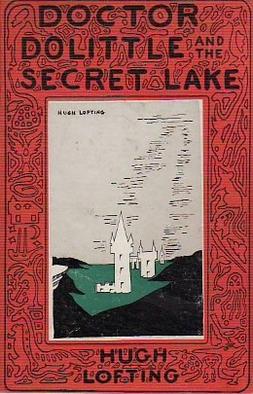Doctor Dolittle and the Secret Lake facts for kids

First edition
|
|
| Author | Hugh Lofting |
|---|---|
| Illustrator | Hugh Lofting |
| Country | United Kingdom |
| Language | English |
| Series | Doctor Dolittle |
| Genre | Fantasy, Children's novel |
| Publisher | J. B. Lippincott |
|
Publication date
|
1948 |
| Media type | Print (Hardcover and Paperback) |
| Preceded by | Doctor Dolittle's Return |
| Followed by | Doctor Dolittle and the Green Canary |
Doctor Dolittle and the Secret Lake is a book from the famous Doctor Dolittle series. It was written by Hugh Lofting, the original author. This book was published in 1948, after Lofting had passed away. It came out 15 years after the previous book in the series.
This story is the longest in the Doctor Dolittle collection. It also has a more serious and sometimes sad tone compared to the other books. This might be because World War II happened before the book was published. Hugh Lofting even wrote an anti-war poem during that time. The book includes strong messages about war and how people can be unkind to each other.
A Different Kind of Adventure
The story begins with Doctor Dolittle feeling a bit down. He gives up on his dream of making human life longer, a dream he had after his discoveries on the Moon. The book also shows the tough parts of nature for the first time. For example, one of the Doctor's experiments, a house for scavengers and parasites, doesn't work out.
Soon, Doctor Dolittle gets an urgent message. He needs to rescue his oldest friend, Mudface the Giant Turtle. Mudface was even a passenger on Noah's Ark!
Mudface's Ancient Story
In this book, we finally hear Mudface's full story about the Great Flood. This part of the story was missing from Lofting's 1923 novel, Doctor Dolittle's Post Office. Mudface's account of the Flood and what happened afterward takes up most of the book.
It's not a happy or lighthearted story. It talks about many difficult times and extreme challenges faced by animals. The story shows how animals struggled to survive during the Flood and its aftermath. It's a powerful look at survival in very tough conditions.
Lofting's Powerful Writing
There isn't as much comedy in this book as in others. However, the small bits of humor help to lighten some of the more serious parts. This book stands out because of its unique style. Many people believe it contains some of Hugh Lofting's most powerful and meaningful writing.
It's also worth noting that Lofting's descriptions of African characters are much less like cartoons than in his earlier novels. This shows a change in how he portrayed them.
 | Kyle Baker |
 | Joseph Yoakum |
 | Laura Wheeler Waring |
 | Henry Ossawa Tanner |

